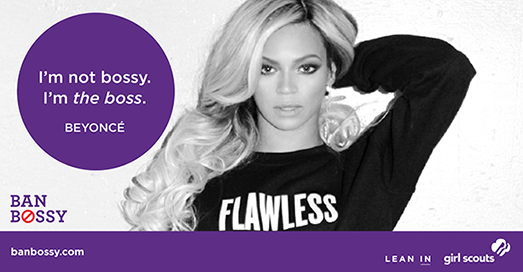“Sticks and stones may break my bones, but words will never hurt me.” We all know this is nothing more than bull spit. They may look or sound like just collections of letters, but words shape our realities. Whether their intent be inspirational, intimidating or isolating, words are influential. It is essential we reexamine our use of language and think critically of its tangible impact. Analyzing and demonstrating self-reflexivity for our own language use and the use of those seemingly insignificant words has now become a pressing matter of social justice.
Who knew the impact one individual letter in the alphabet could have. And of all letters to hold significance it is “y,” that indecisive and rather fickle one. So significant it could change the face of government and business. When these two pen-strokes are attached to the less than threatening word “boss,” it takes on a whole new meaning. A meaning that many believe is telling young girls and women to stay silent, not be assertive and fear judgment when pursuing leadership. So there’s a ban on bossy.
The Ban Bossy campaign was launched by Facebook COO Sheryl Sandberg and now has the support of Michelle Obama, Condoleezza Rice, Girl Scouts of America CEO Anna Maria Chávez, Jane Lynch, Jennifer Garner and Beyoncé. Their televised campaign advertisement presents statistics on the disparity between leadership among young males and females and concludes with Beyoncé making the affirming statement, “I’m not bossy. I’m the boss.” Their mission is to end the intimidation and labeling that leads to a suppression of female leadership. Their website boasts many infographics which state facts such as that between elementary school and high school girls’ self-esteem drops 3.5 times more than boys and that girls are twice as likely to worry about being judged as bossy when in leadership roles. The impact of this is reflected in national statistics that demonstrate the lack of female presence in our leadership. Women compose only 19 percent of U.S. Congress and a meager 5 percent of Fortune 1,000 CEOs.
Some, however, question this correlation or the validity and effectiveness of this campaign. A primary point contested in a March 25 Huffington Post article was the purpose of using the word “bossy.” BJ Gallagher, a sociologist, wrote that “bossy” refers to a negative style of leadership and that replacing the adjective “bossy” for “having leadership potential” would be unproductive. Leadership skills should certainly not be mistaken and labeled as “bossy,” but Gallagher recognizes that identification of genuine “bossy” behavior is a positive occurrence. In her words, “If someone calls you “bossy,” they are telling you that your behavior is off-putting.” From this people can take constructive steps towards employing more effective forms of leadership.
This negativity is refuted through emphasizing the grander goal to recognize the significance of language, demonstrate the impact of labeling and increase our consideration of word choice. Whoever the subject and whatever the word, labels hold a tangible impact within the lives of individuals and influence the trends of our society. As is argued, a ban may not be sensible, as these words serve a purpose within social dynamics and socialization of individuals. However, it is through replacing their use as judgmental expressions of labeling for appropriate purposes that will be successful. We need to utilize a language of consideration and empowerment.
Here on campus we have a network of women’s organizations moving in the same direction. DU’s Women’s Coalition presides over six separate women’s groups on campus: Women’s Leadership Council (WLC), Women’s Staff Alliance for Networking and Development (WAND), Association of Sisters in Higher Education (ASHE), Graduate Women’s Council (GWC), Undergraduate Women’s Council (UWC) and Faculty Women’s Association (FWA). These strive to develop opportunities of leadership that support female empowerment. On their umbrella website you can find more details including resources and upcoming events. So whether you want to join the “Feminism…” campaign or attend the 25th Annual Colorado Women’s Legislative Breakfast, speak up for the women in your life.
Though it is all too easy to recognize the significance of words when directed towards us, it is personal awareness that can be challenging to cultivate. We need to be a conscientious community. Being an ounce more aware, an ounce more considerate and critical could lend itself a long way to changing perspectives. Be a boss at banning ignorance and inequality through language.










